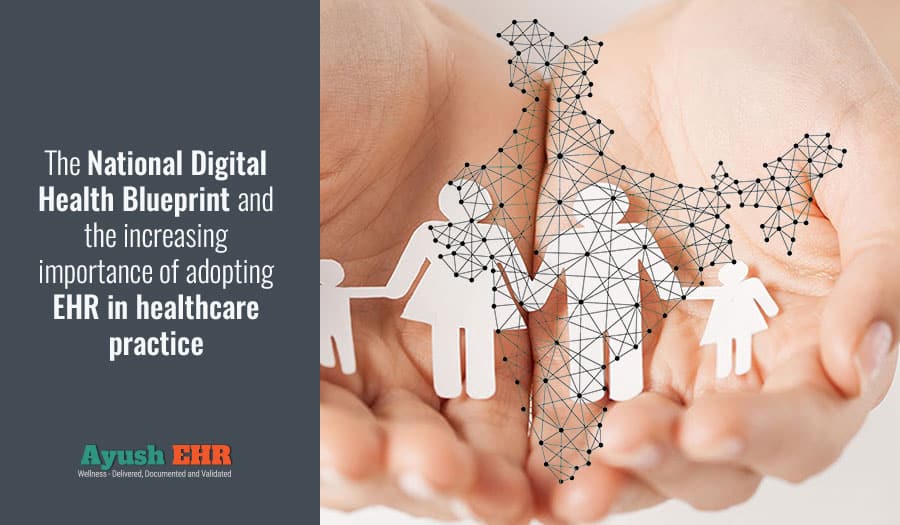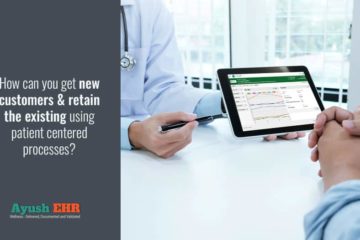National Digital Health Blueprint(NDHB) – India’s blueprint to evolve a Digital Health Eco‐system

The Union Minister of Health and Family Welfare(MOHFW) has released the Final Report on National Digital Health Blueprint (NDHB) in Nov 2019.
The need for such a pan India health IT network that allows the seamless flow of clinical information across the country has been outlined in the document .
Citizen‐centricity, quality of care, better access, universal health coverage, and inclusiveness are some of the key principles on which the National Health Policy (NHP) 2017 is founded. All these aspirations can be realized principally by leveraging the power of digital technologies. In the Indian context, due to its size and diversity, this mammoth task requires that a holistic, comprehensive and interoperable digital architecture is crafted and adopted by all the stakeholders. In the absence of such an architecture, the use of technology in the health sector continues to grow in an uneven manner and in silos.
NDHB is a very ambitious and large scope endeavor to create a framework for the evolution of a National Digital Health Eco‐system (NDHE) – evolving an ecosystem as opposed to centrally creating a system. It recommends the establishment of a specialized organization, called National Digital Health Mission (NDHM) to drive the implementation of the blueprint and promote & facilitate the evolution of NDHE.
You can download the full NDHB document from the Ministry of Health & Family Welfare (MOHFW) website
NDHB Objectives
The key objectives of NDHB include:
- Establishing and managing the core digital health data and the infrastructure required for its seamless exchange
- Promoting the adoption of open standards while implementing digital health systems. This includes all the players creating and using digital health tools across sectors from wellness to disease management
- Creating a system of Electronic Health Records(EHR), based on international standards, which are easily accessible to the citizens and service providers based on citizen‐consent
- Building tools to ensure that the patient is the owner of his/her EHR and Health facilities and government entities maintain the data under trust on behalf of patient. The collection as well as the end use of the data shall be through a consent framework.
- Enabling the use of anonymized data for research purposes following the principles defined.
- Ensuring that the health facilities ensure privacy, security and confidentiality of the EHR data.
- Promoting health data analytics and medical research
- Enhancing the efficiency and effectiveness of healthcare governance at all levels
- Ensuring standards and quality of healthcare
Critical capabilities
The above objectives are proposed to be achieved through the creation and management of 35 building blocks. These building blocks are designed to work together to address the following critical capabilities of the NDHE
- Identification: Unique identification of persons, facilities, diseases and devices
- Citizen to be in control: Maintaining the ownership, confidentiality, security and privacy of the health records
- Service access/delivery: Omni‐channel access/delivery of digital healthcare services that includes web, mobile, call centers & social media
- Interoperability: Interoperability of clinical information is a prerequisite not only for development of integrated digital health services and establishing a continuum of care but also propelling parallel development of innovative value‐added services by entrepreneurs
Impact of National Digital Health Blueprint on healthcare providers
With the publication of the final NDHB, we expect the adoption of standards in healthcare to accelerate. Given it’s comprehensive nature, the document requires all players in the healthcare – modern, traditional & alternative – to collaborate through shared and interoperable clinical documentation.
With AyushEHR, we help AYUSH practices get on the NDHB bandwagon and ensure that they are always connected with the entire country’s healthcare community through the evolving NHDE. Following the creation of standards compliant documentation, we foresee a greater research and validation activity in AYUSH leading to their greater trust and improved adoption.
Learn more
- View demo
- Read documentation
- Get more information
- Write to us
- Call us on +91 63609 97311


